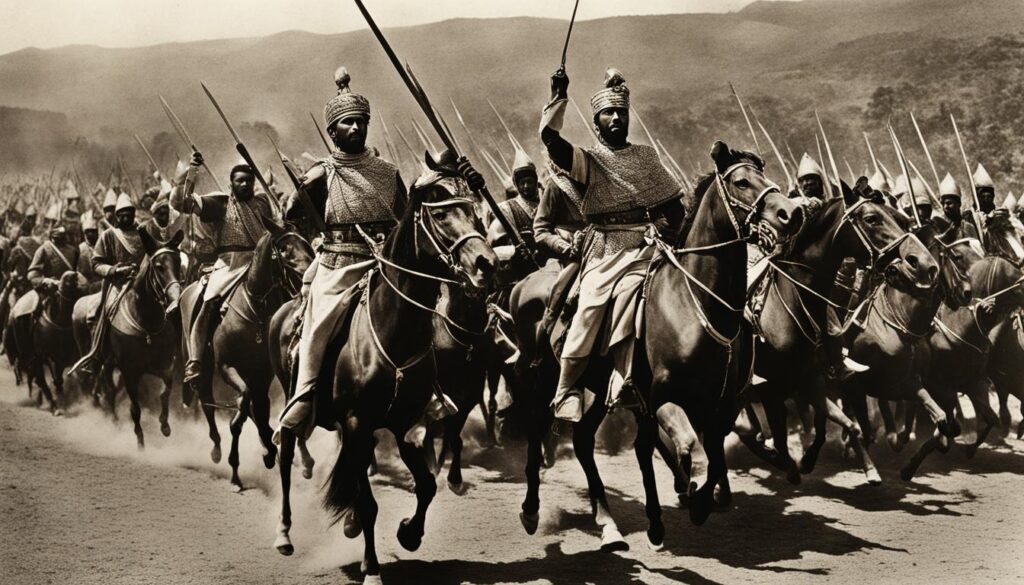How Ethiopia Defeated Italy?
Did you know that in the late 19th century, Ethiopia successfully defeated Italy, a European power, in the Battle of Adwa? This unexpected triumph not only secured Ethiopia’s independence but also had far-reaching consequences, inspiring other African nations in their fight against colonialism.
The Battle of Adwa, which took place on March 1, 1896, marked a significant turning point in the Ethiopian-Italian war. Italy, along with other European powers, sought to establish colonies in Africa during the era known as the “Scramble for Africa.” Italy’s colonial ambitions led them to occupy parts of Somalia, establish the colony of Eritrea, and attempt to conquer Ethiopia.
Key Takeaways:
- The Battle of Adwa was a decisive victory for Ethiopia against Italy in the late 19th century.
- This victory secured Ethiopia’s independence and inspired other African nations in their fight against colonialism.
- Emperor Menelik II played a crucial role in the Ethiopian resistance, uniting regional rulers and mobilizing a well-armed force.
- The Ethiopian army, led by Emperor Menelik II, outmaneuvered and overwhelmed the Italian forces in the Battle of Adwa.
- The resounding victory at Adwa shattered European perceptions of African incapability, challenging racist attitudes and influencing the anti-colonialist movement.
The Scramble for Africa and Italy’s Colonial Ambitions
In the late 19th century, European powers, including Italy, were caught up in the fervor of the “Scramble for Africa.” This scramble was driven by the desire to establish colonial dominance over African territories and exploit their vast resources. Italy, like other European powers, had its eyes set on Africa, particularly Ethiopia.
Italy’s colonial ambitions in Ethiopia began with the occupation of the Red Sea port of Massawa in 1885. This strategic move allowed Italy access to the Horn of Africa and paved the way for further expansion in the region. Italy went on to establish the colony of Eritrea, which served as a launching point for their colonization efforts in Ethiopia. They also occupied parts of Somalia, endeavoring to solidify their control over East Africa.
Italian Expansion in Africa
Italy’s colonial aspirations in Ethiopia mirrored the broader European scramble for African territories. At this time, European powers saw Africa as a source of raw materials, markets for goods, and outlets for surplus populations. They sought to exploit Africa’s resources and establish political, economic, and social dominance.
Italy’s interest in Ethiopia was also fueled by a desire for prestige and power. The colonization of Ethiopia would have allowed Italy to join the ranks of other European powers, such as Britain, France, and Germany, who were already carving up the African continent.
“Our aim is not merely to conquer, but to civilize.”
Italy justified its colonial ambitions by claiming to bring progress and civilization to Ethiopia. This rhetoric of “civilizing mission” was a common narrative used by European powers to legitimize their colonization efforts.
The Impact of Italian Colonialism in Ethiopia
Italy’s colonial ambitions in Ethiopia had a profound impact on the country and its people. The Ethiopian population faced the brutal consequences of colonization, including forced labor, land confiscation, and cultural suppression.
Furthermore, Italy’s occupation of Ethiopia threatened the country’s sovereignty and independence. Ethiopian leaders, most notably Emperor Menelik II, recognized the threat posed by Italian encroachment and mobilized their forces to defend their land and people.
| European Powers | Colonies Established |
|---|---|
| Britain | Various territories, including Kenya, Nigeria, and South Africa |
| France | Algeria, Tunisia, Morocco, Ivory Coast, and others |
| Germany | German East Africa (Tanzania), German Southwest Africa (Namibia) |
| Belgium | Democratic Republic of the Congo (formerly Belgian Congo) |
Table: European Powers and their Colonies
As Italy faced resistance from Emperor Menelik II and the Ethiopian army, their colonial ambitions in Ethiopia would ultimately lead to the historic Battle of Adwa, where Ethiopia emerged victorious against Italian forces.
The scramble for Africa and Italy’s colonial ambitions in Ethiopia were part of a broader historical period characterized by European powers vying for control over African territories. Ethiopia’s successful resistance to Italian colonization stands as a testament to the indomitable spirit and determination of the Ethiopian people in the face of foreign aggression.
Emperor Menelik II’s Resistance and Mobilization

Ethiopian Emperor Menelik II, along with his wife Taytu Betul, played a crucial role in the resistance against Italian invasion. They were determined to defend Ethiopia’s independence and sovereignty. Recognizing the need for modern weapons and a mobilized army, Emperor Menelik undertook extensive efforts to prepare for the upcoming conflict.
Emperor Menelik II’s remarkable leadership and strategic planning allowed him to unite the regional rulers of Ethiopia. Through diplomacy, alliances, and shrewd negotiations, he successfully gathered a formidable force of 80,000 to 120,000 troops (emperor menelik ii). The Ethiopian army, well-armed and prepared, stood ready to face the Italian invaders.
“It is better to die fighting than to be a slave”
Emperor Menelik II’s determination to protect Ethiopia’s freedom was evident in his mobilization efforts. With the support of the Ethiopian people, he rallied the nation to join the cause (ethiopian resistance to italian invasion). Communities from all corners of Ethiopia contributed to the defense, showcasing their unwavering loyalty and commitment to their country.
The mobilization for war involved recruiting soldiers, training them, and equipping them with modern weapons. Emperor Menelik II’s leadership inspired a sense of unity and purpose among the Ethiopian people, enabling them to confront the Italian aggression head-on (menelik ii’s mobilization).
The Ethiopian army, under the command of Emperor Menelik II, marched forward to defend their homeland in the historic Battle of Adwa (ethiopian army in the battle of adwa). Their determination, bravery, and strategic prowess would prove decisive in the face of the Italian invasion.
The Battle of Adwa and Ethiopia’s Decisive Victory

The Battle of Adwa, which occurred near the town of Adwa on March 1, 1896, marked a significant turning point in the fight against colonialism. Led by Emperor Menelik II, the Ethiopian army outmaneuvered and overwhelmed the Italian forces, securing a resounding victory.
The Italians, disorganized and outnumbered, were forced into a full retreat as the Ethiopians inflicted heavy casualties and took thousands of prisoners. This decisive triumph demonstrated the strength, bravery, and strategic planning of the Ethiopian forces, led by Emperor Menelik II.
“Our victory at Adwa was a testament to the power of unity, determination, and the indomitable spirit of the Ethiopian people.”
The Battle of Adwa not only secured Ethiopia’s independence but also shattered the perception held by Europeans that Africans were primitive and incapable of defeating European powers. It challenged the racist attitudes prevalent at the time and forced Europeans to reevaluate their views.
Furthermore, this victory served as an inspiration to other African nations in their fight for independence, becoming a symbol of resistance to colonialism. It ignited the flame of Pan-Africanism and paved the way for future generations in their quest for freedom.
The Battle of Adwa remains a proud moment in Ethiopian history, a testament to the resilience of the Ethiopian people, and a symbol of African triumph against colonial oppression.
The Consequences and Legacy of Adwa
The Battle of Adwa had significant consequences that reverberated far beyond its immediate impact. It shattered the prevailing European perception that Africans were primitive savages incapable of defeating European powers. This remarkable victory forced Europeans to confront the reality that African nations were capable of challenging and defeating colonial aggression. The Battle of Adwa thus challenged racist attitudes and demanded that Africans be taken seriously on the world stage.
The triumph at Adwa also had a profound influence on the fight for independence across Africa. The resounding victory became a symbol of resistance to colonialism and inspired other African nations to intensify their struggle for freedom. The remarkable example set by Ethiopia demonstrated that unity, strategic planning, and the mobilization of resources could lead to triumph over the forces of oppression.
Moreover, the Battle of Adwa played a crucial role in shaping the concept of Pan-Africanism. The resolute Ethiopian defense against Italian aggression proved that African nations could stand together against common enemies, transcending geographical boundaries and tribal differences. Adwa became a touchstone for pan-African unity and solidarity, serving as a rallying cry for later movements advocating for the liberation and unification of the African continent.
“The Battle of Adwa was not only a military victory, but it was also a moral and psychological triumph that shattered the myths of European superiority. It ignited a flame of hope and determination among African peoples, inspiring them to envision a future free from the chains of colonialism.”
– African historian and author
The legacy of the Battle of Adwa continues to permeate contemporary culture and discourse. Its significance as a pivotal moment in African history has been celebrated and referenced in various mediums. For instance, the fictional nation of Wakanda in the Black Panther movies draws inspiration from Adwa’s triumph, portraying an African nation untouched by European domination.
Adwa’s Influence on African Independence Movements
The Battle of Adwa served as a catalyst for African independence movements. It provided hope, inspiration, and a blueprint for resisting colonial powers. African leaders and activists drew strength from the Ethiopian victory, recognizing that a united front and strategic planning were essential in the quest for freedom.
Adwa’s impact extended far beyond Ethiopia’s borders, inspiring figures such as Jomo Kenyatta of Kenya, Julius Nyerere of Tanzania, and Kwame Nkrumah of Ghana. These leaders sought to emulate the tactics and resilience displayed at Adwa, leading their countries to independence and serving as beacons of progress for the entire African continent.
In summary, the Battle of Adwa’s consequences were profound and far-reaching. It shattered European perceptions, inspired other African nations, and influenced the course of African independence movements. Adwa stands as a testament to the indomitable spirit of the African people and their unwavering determination to secure their sovereignty and freedom.
Conclusion
The Battle of Adwa stands as a testament to Ethiopia’s determination and resilience in the face of Italian aggression. This historic clash not only secured Ethiopia’s independence but also ignited a spark of hope and inspiration for other African nations fighting against colonial oppression. Emperor Menelik II’s visionary leadership and the unwavering bravery of the Ethiopian forces turned the tide and left a profound legacy in the annals of African resistance to colonialism. The Battle of Adwa remains a resounding victory and a beacon of African triumph.
By defeating Italy in the Battle of Adwa, Ethiopia shattered the notion held by Europeans that Africans were incapable of resisting European powers. The resolute Ethiopian defense challenged the deeply entrenched racist attitudes prevailing at the time and forced Europeans to acknowledge Africa’s strength and resilience. This triumph at Adwa became a powerful symbol of resistance to colonialism and fuelled the flames of independence movements throughout Africa.
The significance of the Battle of Adwa extends beyond its immediate impact. It inspired the emergence of Pan-Africanism, uniting Africans in their quest for freedom and self-determination. Adwa’s legacy reverberates in various aspects of African culture and history. From literature to cinema, it has served as a source of inspiration and hope, encouraging generations to strive for liberty, justice, and sovereignty.






